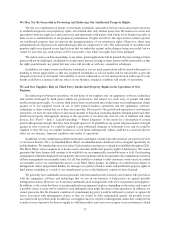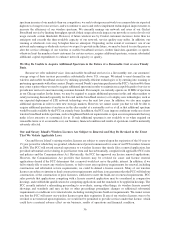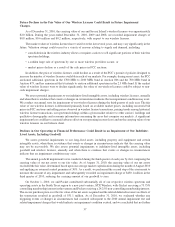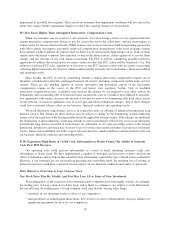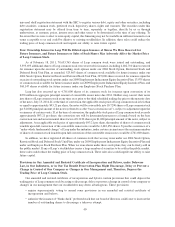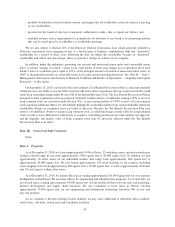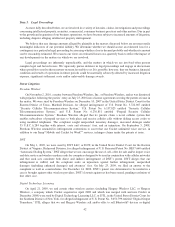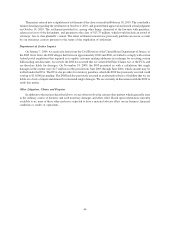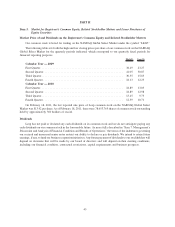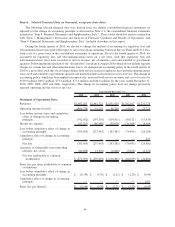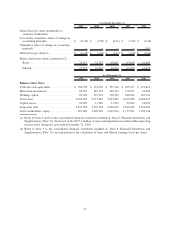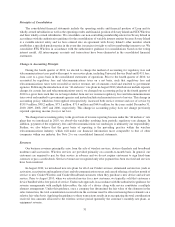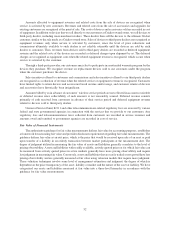Cricket Wireless 2010 Annual Report Download - page 49
Download and view the complete annual report
Please find page 49 of the 2010 Cricket Wireless annual report below. You can navigate through the pages in the report by either clicking on the pages listed below, or by using the keyword search tool below to find specific information within the annual report.cellular telephones, including Kyocera and Sanyo telephones, and that such acts constitute direct and/or indirect
infringement of DTL’s patent. DTL further alleges that we and Hargray Wireless directly and/or indirectly infringe
its patent by providing cellular telephone service and by using and inducing others to use a patented digital cellular
telephone system by using cellular telephones, Bluetooth devices, and cellular telephone infrastructure made by
companies such as Kyocera and Sanyo. DTL alleges that the asserted infringement is willful, and the complaint
seeks a permanent injunction against further infringement, unspecified damages (including enhanced damages),
attorneys’ fees, and expenses. On January 5, 2010, this matter was stayed, pending final resolution of another case
that DTL brought against another wireless provider in which it alleged infringement of the patent that is at issue in
our matter. That other case has been settled and dismissed but the stay in our matter has not been lifted.
Securities and Derivative Litigation
Leap was a nominal defendant in two shareholder derivative suits and a consolidated securities class action
lawsuit. As indicated further below, each of these matters settled and the settlements received final court approval.
The two shareholder derivative suits purported to assert claims on behalf of Leap against certain of its current
and former directors and officers. One of the shareholder derivative lawsuits was filed in the California Superior
Court for the County of San Diego on November 13, 2007 and the other shareholder derivative lawsuit was filed in
the United States District Court for the Southern District of California on February 7, 2008. The state action was
stayed on August 22, 2008 pending resolution of the federal action. The plaintiff in the federal action asserted,
among other things, claims for alleged breach of fiduciary duty, gross mismanagement, waste of corporate assets,
unjust enrichment, and proxy violations based on the November 9, 2007 announcement that we were restating
certain of our financial statements, claims alleging breach of fiduciary duty based on the September 2007
unsolicited merger proposal from MetroPCS and claims alleging illegal insider trading by certain of the
individual defendants. Leap and the individual defendants filed motions to dismiss the federal action, and on
September 29, 2009, the district court granted Leap’s motion to dismiss the derivative complaint for failure to plead
that a presuit demand on Leap’s board was excused.
The parties in the federal action executed a stipulation of settlement dated May 14, 2010 to resolve both the
federal and state derivative suits. The settlement was subject to final court approval, among other conditions. On
September 20, 2010, the district court held a final fairness hearing to approve the settlement, and on September 22,
2010 the district court granted final approval of the settlement, resulting in a release of the alleged claims against the
individual defendants and their related persons. On September 22, 2010 a judgment was issued in the federal case,
and on October 7, 2010 a dismissal with prejudice was entered in the state case. The settlement was based upon our
agreement to adopt and implement and/or continue to implement or observe various operational and corporate
governance measures, and to fund, through our insurance carriers, an award of attorneys’ fees to plaintiffs’ counsel.
The individual defendants denied liability and wrongdoing of any kind with respect to the claims made in the
derivative suits and made no admission of any wrongdoing in connection with the settlement.
Leap and certain current and former officers and directors, and Leap’s independent registered public
accounting firm, PricewaterhouseCoopers LLP, also were named as defendants in a consolidated securities
class action lawsuit filed in the United States District Court for the Southern District of California which
consolidated several securities class action lawsuits initially filed between September 2007 and January 2008.
Plaintiffs alleged that the defendants violated Section 10(b) of the Exchange Act and Rule 10b-5, and Section 20(a)
of the Exchange Act. The consolidated complaint alleged that the defendants made false and misleading statements
about Leap’s internal controls, business and financial results, and customer count metrics. The claims were based
primarily on the November 9, 2007 announcement that we were restating certain of our financial statements and
statements made in our August 7, 2007 second quarter 2007 earnings release. The lawsuit sought, among other
relief, a determination that the alleged claims could be asserted on a class-wide basis and unspecified damages and
attorney’s fees and costs. On January 9, 2009, the federal court granted defendants’ motions to dismiss the
complaint for failure to state a claim. On February 23, 2009, defendants were served with an amended complaint
which did not name PricewaterhouseCoopers LLP or any of Leap’s outside directors. Leap and the remaining
individual defendants moved to dismiss the amended complaint.
43


